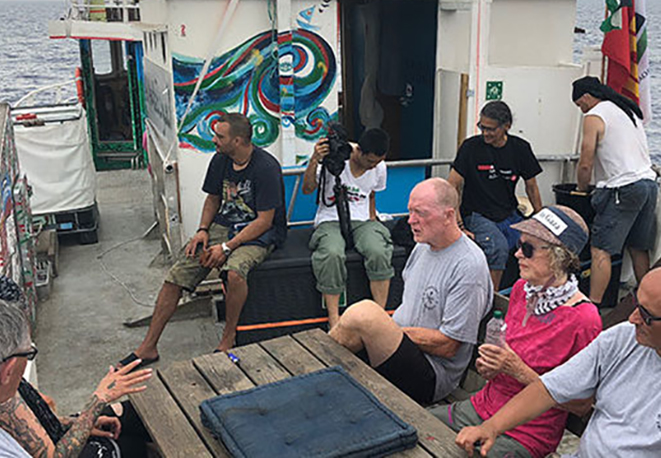By Chris Graham on board the Al Awda
By the time you read this, I’ll be sailing on an old, converted fishing trawler from Sicily, Italy, headed for Gaza, Palestine, the tiny sea port in the bottom right corner of the Mediterranean Sea.
I’m on board the Al Awda as a journalist, covering the Freedom Flotilla to Gaza, an event staged every year or so to challenge the Israeli naval blockade that has been imposed on the Palestinian community for just over a decade.
Gaza is home to more than 2 million Palestinians. It’s a small strip of land that takes less than an hour to drive, from north to south. It borders Israel in the north, and Egypt in the south and is regarded as the world’s largest open air prison.
It’s called that because the people of Gaza do not have freedom of movement, like other global citizens. Their nation is occupied by Israel, which has prevented travel to and from by an air and land, in addition to the sea.
Israel’s rationale is that Hamas, the democratically elected leadership of Gaza, is a “terrorist” organisation that fires rockets.
Hamas does occasionally fire home-made, unguided rockets into Israel. Israel, by contrast, fires shells, sends drones, tanks, soldiers, naval ships, and American-built jet fighters. It has one of the most powerful armies on earth, as the body count – hopelessly one-sided in favour of Israel – should remind anyone.
That’s part of why I’m going to Gaza. I visited the West Bank in 2016, but was denied entry to Gaza by Israel. It is a nation with a long history of preventing journalists from scrutinising its actions.
Staring down Israeli army
I’m also going to report on the activists who are going to stare down one of the world’s great armies.
I’ve spent the past 10 days with dozens of them. I’m surprised at how inspired I’ve been.
In 2010, the Israeli Defence Force attacked the Mavi Marmara, a ship in the Flotilla with almost 700 activists on board. 10 were killed, at least six of them execution-style, including two journalists.
Israel was also subsequently found by the United Nations to have tortured hundreds of other activists in the days that followed.
The activists in the 2018 Flotilla also know that in the past few months, Israel has shot and killed more than 130 unarmed Palestinian protesters, during the Great Return protests, which have seen thousands more injured.
Footage of Palestinians – unarmed, waving flags – being sniped dead by Israeli soldiers on the other side of the border fence is shocking, and yet there has been barely any international response, including from Australia, which urged “both sides” to show restraint.
US ‘blind eye’
The Flotilla activists also know that there is little to no international sanction against Israel for its repeated violations of international and human rights law. Israel has a powerful friend in the United States, which routinely turns a blind eye to its violent excesses.
And yet, the 2018 Flotilla activists – featuring almost three dozen activists and three boats in total (a fourth has had to drop out) – are still prepared to get on boats and sail to Gaza, to try and break the Israeli blockade.
As a journalist, the threats I face are markedly reduced to those faced by the activists. I’m likely to be targeted in the initial raid by the Israelis, which, based on past experience, will be hyper-aggressive and violent.
But once the raid is over – once the Flotilla is under Israeli control – I’m likely to be treated far better than the activists on board.
I face at most a few days in jail, before being deported – ironically for illegally entering Israel. Of course, at no stage will I ever voluntarily enter Israel. I’m on a boat bound for Gaza, a city of another nation.
But instead, Israel will forcibly board the Flotilla in international waters, take the crew and passengers captive, and force them to an Israeli prison.
For this too, there will be no international sanction, although it pales into comparison compared to what the people of Gaza, and Palestinians in the West Bank face every day.
Deafening silence
The threat from Israel to journalists trying to report on the Freedom Flotilla is that all of your equipment will be confiscated, you’ll be jailed for a brief period, and you’ll then be deported, thus affecting international travel from that point forward.
But those threats are precisely why journalists should stare them down. They’re precisely why journalists should go on the Freedom Flotilla, and should find ways to get into Gaza, whether the Israeli military approve it or not.
Bad things happen when good people stay silent, as history well records. But horrendous things happen when media are prevented from scrutinising the actions of a state.
I hope to bring you stories from Gaza if the Flotilla breaks the blockade. But more likely, I’ll bring you stories of Israel once again flouting international and humanitarian law, and the deafening silence that inevitably follows from the international community.
I’ll file as soon as I’m able.
Chris Graham is the publisher and editor of New Matilda. He is the former founding managing editor of the National Indigenous Times and Tracker magazine. Graham has won a Walkley Award, a Walkley High Commendation and two Human Rights Awards for his reporting. Asia Pacific Report republishes this article with permission. New Zealand trade unionist Mike Treen is also on board the Al Awda.













































